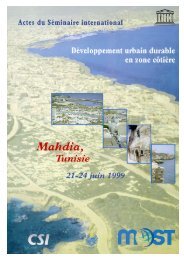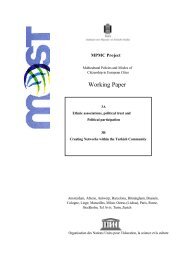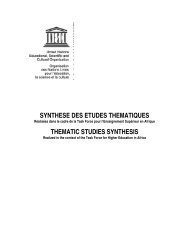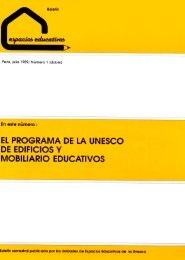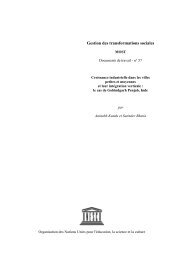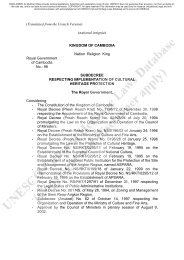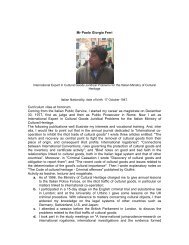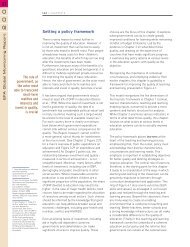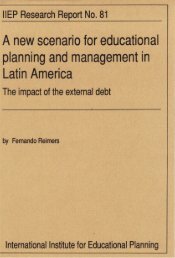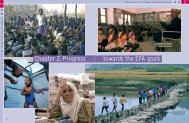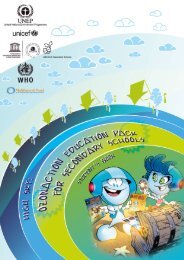Financing Education / pdf - Unesco
Financing Education / pdf - Unesco
Financing Education / pdf - Unesco
You also want an ePaper? Increase the reach of your titles
YUMPU automatically turns print PDFs into web optimized ePapers that Google loves.
2<br />
0<br />
8<br />
0<br />
CHAPTER 4<br />
<strong>Education</strong> for All Global Monitoring Report<br />
France was<br />
the largest<br />
contributor to<br />
the education<br />
sector during<br />
2004–2005,<br />
committing<br />
US$1.5 billion<br />
a year<br />
have seen their share decrease by about two<br />
percentage points. This is the case for Ghana,<br />
Malawi and Senegal. A positive trend in relation<br />
to achievement of the EFA goals is that the share<br />
of basic education in total aid to education in each<br />
of the top ten recipient countries has increased,<br />
averaging 76% in 2004–2005. In these countries,<br />
the increase in aid to basic education has resulted<br />
more from a higher priority given to this level than<br />
from the global increase of aid to education.<br />
The data presented so far do not show the<br />
major year-on-year variations that occur in<br />
aid commitments. For instance, very large<br />
commitments for basic education were made<br />
to several of the ten largest recipients in 2004,<br />
including to some of the world’s most populous<br />
countries. Bangladesh, for one, received<br />
commitments of US$700 million for basic education<br />
in 2004 and India received US$950 million (see<br />
annex, Aid Table 4). This pattern was not repeated<br />
in 2005.<br />
Changing donor strategies for education<br />
Donor strategies for education in general, and<br />
for basic education, vary. As was highlighted in<br />
Table 4.8, for all donors combined, the priority<br />
given to education remained mostly stable over<br />
1999–2005. However, individual donors behaved<br />
differently, as Table 4.10 shows. Among multilateral<br />
donors, IDA and the European Commission have<br />
been the largest contributors to education. IDA’s<br />
commitments amounted to an average of<br />
US$1.4 billion annually in 2004 and 2005, which was<br />
72% above the level in 1999. The reason was more<br />
an increased level of total IDA aid than a higher<br />
priority for education. European Commission<br />
contributions averaged US$0.8 billion annually in<br />
2004 and 2005. This was equal to only 8% of all<br />
sector grants, a lower share than almost all other<br />
multilateral and bilateral donors, and represented<br />
a decrease in the share compared to 1999.<br />
The importance accorded to education within total<br />
aid varies among bilateral donors. France was the<br />
largest contributor to the education sector during<br />
2004–2005, committing US$1.5 billion a year, which<br />
was 40% of its total aid to sectors. The next largest<br />
donors were Japan, at US$1 billion, and the United<br />
States, with US$670 million. These levels of aid<br />
represent a relatively small share of their total aid.<br />
Japan allocates only 12% of its sector aid to<br />
education (up from just 5% in 1999), and the<br />
United States less than 4%.<br />
The distribution of aid across levels of education<br />
is also crucial. Aid to basic education is divided<br />
into early childhood education, primary education<br />
and basic life skills for youths and adults,<br />
including literacy. As previous Reports have<br />
pointed out, within basic education, pre-primary<br />
education receives low levels of aid. In 2004,<br />
nineteen of the twenty-two donors responding<br />
to a request for information reported allocating<br />
to pre-primary less than 10% of the amount they<br />
made available for the primary level, and a<br />
majority allocated less than 2% (UNESCO, 2006a).<br />
As a share of total aid to education, the majority<br />
allocated less than 0.5%. Data on aid to literacy<br />
programmes are also difficult to collect, but it<br />
is clear that most donors have given them very<br />
little priority (UNESCO, 2005a).<br />
On average, multilateral donors allocated 53%<br />
of their total aid to education to the basic level<br />
in 2004–2005, compared with 43% for the bilateral<br />
donors. However, the bilateral share did represent<br />
an eight percentage point increase compared with<br />
1999–2000. These averages hide wide variations.<br />
IDA allocated 61% of its education aid to basic<br />
education and the European Commission 46% in<br />
2004–2005. The Fast Track Initiative Catalytic Fund<br />
allocated all of its aid to basic education. Donors<br />
had committed a total of US$570 million to the<br />
fund by 2006 and pledged to commit a further<br />
US$360 million by the end of 2007. As of the end<br />
of June 2007, US$130 million had been disbursed<br />
to eighteen countries.<br />
Bilateral donors differ widely in how they view<br />
basic education. Canada, Denmark, Finland,<br />
Ireland, the Netherlands, New Zealand, Norway,<br />
the United Kingdom and the United States clearly<br />
make basic education a top priority and allocate<br />
more than half of their education aid to it. Other<br />
donors allocate less than one-third of total<br />
education aid to basic education. This group<br />
includes France, Germany and Japan – countries<br />
that subsidize large numbers of foreign students<br />
in their universities and therefore allocate a large<br />
part of their education aid to the post-secondary<br />
level (Figure 4.13).<br />
Finally, among some of the largest contributors to<br />
education, there was a dramatic reduction in aid to<br />
basic education in 2005. The United Kingdom and<br />
IDA, in particular, decreased commitments for aid<br />
to basic education by 70% and 80%, respectively<br />
(see annex, Aid Table 2). The donors that reduced<br />
160



